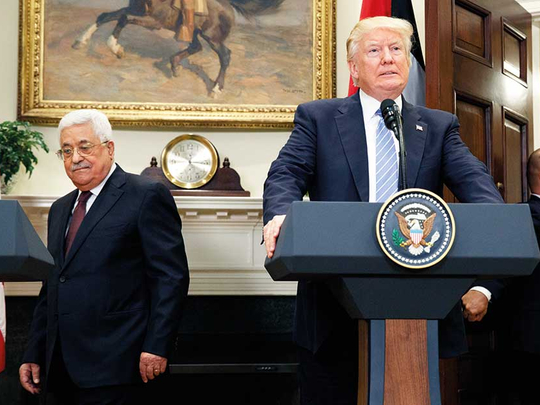
Ramallah: There seems to be no going back for Mahmoud Abbas after the Palestinian leader lashed out at US President Donald Trump over his reckless decision to recognise Occupied Jerusalem as Israel’s capital.
Abbas’ pivot from quiet diplomacy to standing up to the US and Israel brings him in line with his aggrieved public.
Some questions and answers about the conflict:
What has changed?
The mostly unscripted barnburner - out of character for the typically buttoned-down Abbas - marked the culmination of his frustration with the US administration.
In the span of a few weeks, Trump smashed what Palestinians see as the ground rules of US mediation in their conflict with Israel.
Trump recognised occupied Jerusalem as Israel’s capital, then portrayed Abbas’ subsequent rejection of Washington as an unfit broker as a blanket refusal to negotiate, and later followed through on a pledge to cut US aid to the Palestinians.
Palestinians say this is tantamount to blackmail and blaming the victim for the snag in peace talks.
Abbas lashed out at Trump but also his ambassadors to the UN and to Israel, Nikki Haley and David Friedman.
His core message was to reject pre-emptively what he fears to be an upcoming US plan for a Palestinian mini-state on only some of the lands captured and occupied by Israel in 1967 and without a foothold in Jerusalem.
“We will not accept a deal America dictates,” Abbas said defiantly.
On Tuesday, a US official said the Trump administration was withholding $65 million of the planned $125 million installment for the UN Relief and Works Agency, which focuses on giving health care, education and social services to Palestinians in the West Bank, Gaza Strip, Jordan, Syria and Lebanon.
What now?
A day after Abbas’ “exit speech” from two decades of intermittent, US-led talks with Israel, a PLO decision-making body outlined a bold approach - at least on paper.
The Palestinian Central Council called for suspending the PLO’s 1993 recognition of Israel, halting security coordination with Israel and ending Palestinian compliance with interim peace deals from the mid-1990s. These so-called Oslo Accords had created the Palestinian autonomy government, headed by Abbas since 2005, and defined Israeli-Palestinian relations.
The final decision lies with Abbas. Aides and Palestinian analysts suggested he will move cautiously.
Implementing the council decisions could quickly escalate tensions with the hard-line government of Israeli Prime Minister Benjamin Netanyahu, and possibly bring about the collapse of Abbas’ financially fragile self-rule government which administers parts of the West Bank.
Ending compliance with the Oslo Accords could also remove any justification for the continued existence of the Palestinian Authority.
The foreign aid-dependent Palestinian Authority shoulders the responsibility for the welfare of millions of Palestinians that would otherwise fall on Israel as the occupier. The Oslo Accords have also created a Palestinian political class eager to protect its perks, while hundreds of thousands of Palestinians depend on autonomy government salaries.
What is the alternative?
Abbas hopes to generate more pressure on Israel, including international sanctions, to force an end to its half-century-old occupation, said PLO official Hanan Ashrawi.
“Without accountability, without Israel understanding that there is a price to be paid for its intransigence, it is not going to budge,” she said.
But there are no firm commitments of support, despite sweeping condemnation of Trump’s Jerusalem move in recent UN Security Council and General Assembly votes.
Europe, for years relegated by Washington to the role of Middle East paymaster, hasn’t signaled a new assertiveness in the Israeli-Palestinian conflict.











